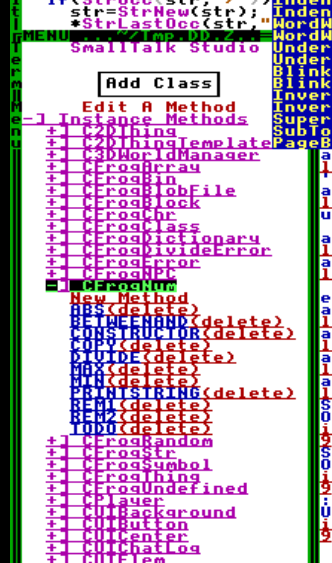Welcome to the mother[redacted for GH]ing pooping frogs repo. Here you will learn to use the engine. It currently has a Smalltalk-80 scripting engine,3D ray caster engine and UI code along with tooling like a level and texture editor. I will make little distinction between the internals of each part and the tool usage because if you are actually intrested in contributing to the project you will want both
SmallTalk80 is a sexy language. I will use it to support "transparent" calls to objects over the network in the future. It is a compiler that compiles to HolyC because I am too lazy to write another "proper" compiler and I think it is ok for maintainability
The SmallTalk 80 lexer is cool and operatess like TempleOS's lexer to some degree. The main secret-sauce is in Lex which is a gaint state machine. The lexer can put back a charactor with the LEXf_USE_LAST_CHAR␅ flag in addition to ->last_chr member.
The purpose of a lexer is to turn things like 123 and 'string' into tokens like TK_NUMand TK_STR. N ormal tokens(single charactor tokens) are just returned in the ->tok member but sexy ones have special names like TK_CHR.
- Turn
-2into'-'andTK_NUM(instead of justTK_NUMwith value-2.0). This is the orthodox(?) behavoir
The purpose of the parser is to take the data from the lexer and turn it into an Abstract Syntax Tree(class CAST). The CAST class is just a union. The most notable tricky part of the parser is that it only uses 1 token at a time.
- Call
Lexbefore entering a parser function - check current token with
lex->tok - Use
Lexto get the next token once you accept the token
Cascades are parsed like:
Head abc:123 ; def: 456 .
'same as' .
Head abc:123 . Head def: 456 .
In the syntax tree the head is represeneted by AST_CASCADE_HEAD and the ->body is the "operations" of the cascade.
Variables are added via RemFromScope and AddFromScope,use FramePtr to check for a valid vairable name.
This part is heavily influenced from the next section(the runtime).
The compiler is a stack machine that uses StackFrame2Var(stack_ptr) to get the stack locations. This compiler is a real mother[redacted for GH]er and and does not use hash tables for variables. They (the varaibles) are put in the CLocalsGeneric0->_body[idx]member and and the idx is computed at compile time.
Each CLocalsGeneric0 can reference it's parent's context via the CLocalsGeneric0->_parnent at runtime,not compile-time. Compile-time things are calculated via GenerateLocalsFromMethod and it's homie GenerateLocalsFromThunk Use STGetLocal to generate an expression to grab a local varaible
Member variables are actually of type FROG_SMALL_MEMBER_PTR and need to be reduced from self. Do this(and read BungisReduce),I can't help you beyond that
DocPrint(doc," tmp=BungisReduce(self,&");
STGetLocal(doc,locals,var->name);
DocPrint(doc,");\n");Use CompileAST to generate an expression from parser data. Also in the CompileThunk and CompileMethod functions,you need to make a variable frame on the heap,do this via STNewBlockFrame("tmp_class_name",parent) and STNewMethodFrame. The temporary class for the frame is generated from GenerateLocalsFromThunk(method)->name. The tmp_class_name is a JIT compiled class for HolyC
All smalltalk types (except for temporary frames) have a baseclass ofCFrogThing which are made with ContructThing.
ConstructThing will allocate a garbage collected thing CFrogThing. ConstructThing will fill in members with FROG_SMALL_NIL on creation,of if the dft meta data is set it will use that. Special members include
U8 *constructor dft "InitClass";This is called to init the classU8 *constructor dft "FreeClass"This is called onThingDeling the class
Use ThingDel to decrease the reference count on an object, and use FrogGarbageCollect to go 21 Savage boomin on those sneaky ass mother[redacted for GH]ing memory leaks.
For convienence
- Functions will
ThingDelthier arguments(except for self) - Arguments are passed via
argcandargv - HELP WANTED,make things delete thier members for automatically
Use CallScript on a mother[redacted for GH]ing CFrogClassto call a method on it. Methods are function pointers in a frame-pointer. Make it like this
FramePtrAdd("CFrogBlock@value",&FrogBlockValue);MAKE CLASS METHODS LIKE THIS Put a period before the class name to make a class methid
//Notice the period and [redacted] your [redacted for GH]
FramePtrAdd(".CFrogThing@basicNew",&FrogThingNew)␅Builtins can be made via the CreateBuiltin function. This mother[redacted for GH]er will automaticcaly free the arguments and [redacted for GH] and check types for u
ConstructBuiltin("FrogNumNew(AsF64(self)+AsF64(a))","CFrogNum","+","CFrogNum","a");The main secret sauce you will want to work with is Studio.HC. This mother[redacted for GH]er will open up a Class editor that looks like this

Click the Add-Class button to add/edit classes
Use the tree widget to add methods and cool [redacted for GH],it even comes with a sexy syntax highlighter

Once you are done press shift-esc to get a repl,then press Ctrl+Alt+x to exit the repl